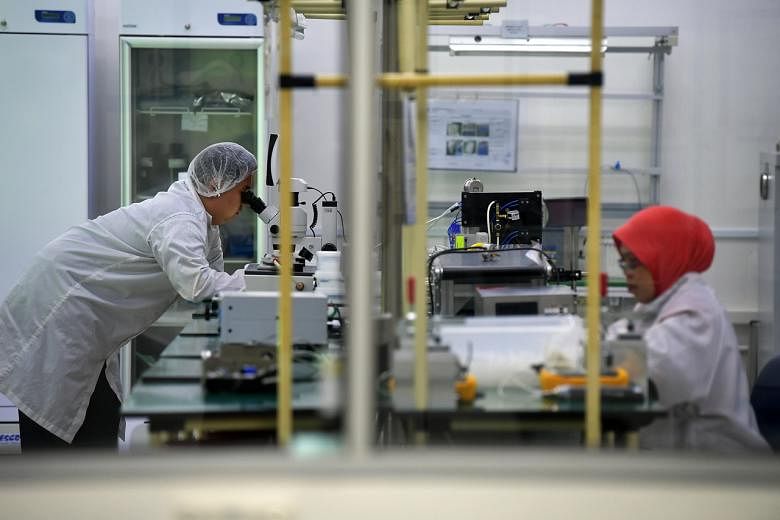SINGAPORE - A $25 billion plan charting the country's research landscape was launched on Friday (Dec 11), a critical investment that will help the economy emerge stronger from the shadow of Covid-19, while ensuring the country shores up its defences against future threats.
Among the plans is a national effort to help Singapore respond nimbly to future infectious diseases.
The pandemic has accelerated technological trends and structural changes that will reshape the global economy, and throw up new challenges for societies, said Deputy Prime Minister Heng Swee Keat at a press conference to lay out the Research, Innovation and Enterprise (RIE) 2025 plan.
"Science, technology and innovation will be critical to overcome Covid-19 and in enabling us to emerge stronger," said Mr Heng, who is also chairman of the National Research Foundation (NRF).
The five-year blueprint will focus on four key areas - health, sustainability, the digital economy, and manufacturing; with firm support for basic research. One-third of the budget will go towards basic research, whose benefits may not be immediately obvious.
The $25 billion under the plan is equivalent to around 1 per cent of the nation's gross domestic product. This proportion has remained relatively constant over the years, and puts Singapore's public investment into research on a par with other small advanced economies such as Sweden and Denmark, said the NRF.
Mr Heng said one-third of the overall RIE budget will be committed to basic research, for RIE2025 and beyond.
"The salience of basic research outputs might not be immediately obvious, but they form the foundations of downstream breakthroughs," he said.
The four key domains under the RIE are human health and potential; manufacturing, trade and connectivity; urban solutions and sustainability; and smart nation and the digital economy. The scope under each domain will be expanded to meet the broader spectrum of national needs, he said.
For instance, research into manufacturing will now also include studies into the air and sea links that connect Singapore with the rest of the world, while urban solutions and sustainability will now include research into the new challenges posed by climate change.
Health and biomedical sciences had been expanded to human health and potential to address a key national priority - a rapidly ageing population, Mr Heng noted.
"We seek to bring the best out of every individual by focusing on improving pre-natal and early childhood development, learning outcomes in children and adults, and the health and contribution-span of our seniors."
Besides the four areas, there will also be $3.75 billion set aside for "white space" research, up from $2.5 billion in RIE2020. This is funding dedicated to new or emerging areas of research that may arise in the next few years and is open to proposals from all agencies.
The commitment underscores the importance of research even during difficult times, said NRF chief Low Teck Seng.
During the current crisis, he pointed out, the scientific community in Singapore had rallied even during the early stages of the pandemic, pivoting away from their original research areas and applying their expertise to Covid-19.
Diagnostic test kits were developed in record time, treatments tested, and clinical trials for a locally developed Covid-19 vaccine are under way.
"Investments in science and technology are an investment in the future," added Prof Low, noting that such investments could also provide good jobs for Singaporeans, and enhance and contribute to the nation's GDP growth.
For instance, investing in water technologies had not only helped this water-scarce nation overcome its resource constraints, but also built a thriving industry.
In 2018, Singapore's water industry contributed $2.5 billion to the economy, and created some 14,400 jobs.
In a Facebook post on Friday, Prime Minister Lee Hsien Loong said that the scientific mindset is critical.
Pointing out that astronomers had discovered mysterious circles in the cosmos using a new massive radio telescope in Western Australia, he said: "Whether it's discovering mysterious radio emissions or developing vaccines against Covid-19, science is exciting and important.
"The scientific mindset - exploring the world and understanding it rationally and empirically - is crucial to Singapore. This is true not just in R&D work, but more fundamentally to the ethos of our whole society."
Mr Lee, who chaired the Research, Innovation and Enterprise Council meeting on Thursday night, added: "Our continued investments in R&D will sustain our competitiveness and bolster our status as a tech and innovation hub.... With the profound uncertainties ahead, RIE2025 will be a crucial differentiator in refreshing our economic strategy, and securing our future for a post-Covid world.


